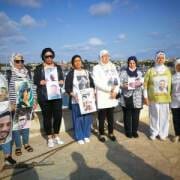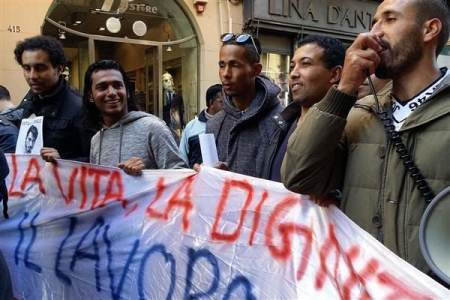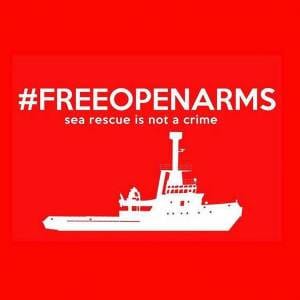The Dead: The Sea Can’t Take Them Any More
The sea now leaves many of the dead on the beaches of Libya, the very same from which so many depart in search of a new life, a life which has then been denied them, men and women of all ages. In the last week some have been recovered by humanitarian vessels such as Aquarius and Dignity managed by Médecins Sans Frontières. The most recent are the 22 bodies of young women which were disembarked last week at Trapani. Women and children are the first to die in the journey from Libya to Italy, due to their position within the vessels.
No one speaks about it anymore, not the TV, nor the journalists who are overly fixated on counting the number of arrested people smugglers, who are always young and recently also include women.
In one week alone around 1,000 people arrived at Trapani, putting a strain on the better of Sicily’s reception systems: the situation of minors and adults suited for the relocation program present a particular difficulty, as there are no longer any places left in the centres. This has led to an increase in the number of days spent at the Milo Hotspot, in which everyone is quickly identified and photographed, though in the confusion some have managed to escape, while others have been shown the door and returned to sender.
This situation was shown especially at the last disembarking, where the presence of a large number of Egyptians ground down the cogs of the Trapani system. In the brief journey from port to Hotspot, many of the presumed minors were declared adults. And the Egyptian adults were sent back by a plane from Palermo. We are verifying the truth of the news that one of them was blind.
Last week, 7 Tunisians arrived on the beach of Favignana on a small vessel undetected by Maritime agencies, who were then repatriated by plane from Palermo. That the situation is getting worse is shown by the forms of rescuing and disembarking in the Sicilian ports: the priority remains identifying the presumed people smugglers/boat drivers (the scapegoats of irregular migration), leading to the dividing up of families who departed together. There are women who search for their husbands and siblings, a situation occurring with every greater frequency, causing huge psychological problems for people already under profound strain. One example among many: last week a 6-year-old girl in Palermo was looking for her father who had been taken to Syracuse.
The doors are also being closed in the faces of Nigerians who arrive in Lampedusa, transferred to the detention centre (CIE*) at Pian del Lago so as to then be repatriated to Nigeria (22 people in total, coming from different centres in Italy), thanks to a plane co-managed with the EU agency Frontex. While on the ferry from Lampedusa to Porto Empedocle a Moroccan and a Libyan were rejected, left at the train station as happened some months ago, in the times of the deferred rejections. The feeling we get is that all these forms of exclusion are being undertaken to deal with the lack of places in the reception centres.
In the Lampedusa Hotspot – where the Frontex team numbers 25 staff, vs 2 from humanitarian organisations – as in the Hub at Villa Sikania, we continue to note overcrowding and lack of appropriate separation by age and gender, as well as various cases of psychological abuse in the taking of fingerprints.
No one wants to look at the dead, no one wants to have them on their conscience, not even the sea.
Alberto Biondo
Borderline Sicilia Onlus
Project “OpenEurope” – Oxfam Italia, Diaconia Valdese, Borderline Sicilia Onlus
* CIE: Centro di Identificazione ed Espulsione: custody to secure deportation
Translation: Richard Braude



